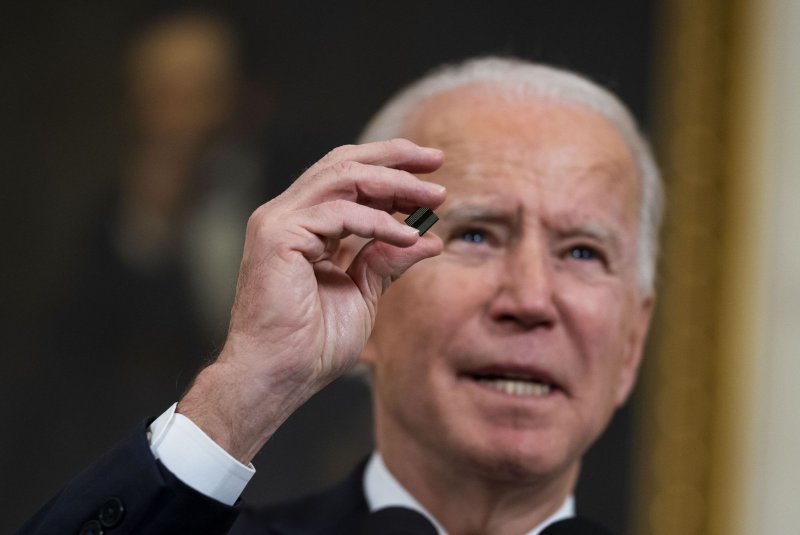U.S. President Joe Biden’s administration announced a probe Monday into China’s use of “extensive anticompetitive and non-market means” as part of what Washington says is a bid to take control of the global market for “workhorse” chips used in a wide variety of everyday applications but which nevertheless are vitally important for critical industries. File Photo by Doug Mills/UPI |
License PhotoDec. 23 (UPI) — The United States on Monday launched a probe to look at China’s use of “extensive anti-competitive and non-market means” in its bid to dominate the global market for legacy “workhorse” semiconductors and the impact on the U.S. economy.
The special so-called 301 investigation will focus on “foundational” chips entering the United States inside products used in critical industries including defense, aerospace, telecoms, power infrastructure and medical devices, the White House said in a news release.
“Today, the Biden-Harris Administration is taking additional action to protect American workers and businesses from the People’s Republic of China’s unfair trade practices in the semiconductor sector and support a healthy domestic industry for foundational semiconductors,” it said.
A U.S. Trade Representative Office notice said evidence showed China was setting and pursuing market share targets in pursuit of “indigenization and self-sufficiency,” and its acts, policies and practices were negatively impacting the economies of the United States and other countries, undercutting the competitiveness of American industry and workers, and “critical U.S. supply chains, and U.S. economic security.”
It pointed to how “Made in China 2025” set numerical targets for China’s domestic semiconductor capacity and production, saying it reflected China’s targeting of the semiconductors sector for dominance.
The investigation will also initially assess the impact on U.S. commerce of tactics employed by China in the production of silicon carbide substrates, or other wafers used as inputs into semiconductor fabrication.
“This investigation underscores the Biden-Harris Administration’s commitment to standing up for American workers and businesses, increasing the resilience of critical supply chains, and supporting the unparalleled investment being made in this industry,” USTR Ambassador Katherine Tai said in a news release.
USTR said China used an extensive range of anti-competitive and non-market means, including “Chinese Communist Party guidance, directives, and control within state and private enterprises, activities of state-owned or state-controlled enterprises, market access restrictions and opaque regulatory preferences and discrimination.”
Other tactics included wage-suppressing labor practices, massive state subsidies — including earmarked funding — and forced technology transfer including state-directed cyber attacks and theft of intellectual property.
These actions were fueling a significant expansion of production capacity, producing a softening of prices globally to uneconomic levels, a protected domestic market and an overconcentration of production capacity within China.
“Evidence indicates that in just six years, China has nearly doubled its global share of foundational logic semiconductors production capacity. Based on announced new fabrication plants. China’s share is projected to reach approximately half of the world’s capacity by 2029,” warned USTR.
It added that projections showed China would also lead production capacity for other types of legacy semiconductors, such as power chips, and that this emerging dominance was already having a chilling effect, disincentivizing investment by authentic players in the sector that adhered to the rules of the market.
The investigation will be informed by a two-month public consultation, scheduled to open for comments on Jan. 6, culminating in a two-day hearing on March 11-12, the USTR office said, noting that it had also requested consultations with China on the issue in line with U.S. trade law.
Monday’s announcement is part of a back-and-forth escalation of a U.S.-China spat over the sector and technology in general, with AI a particular issue of contention.
Earlier this month, Beijing banned exports to the United States of key semiconductor raw materials including gallium, germanium, antimony other superhard materials to the United States in retaliation for new U.S. rules prohibiting the export of semiconductor technology to China.
The Biden administration has introduced a series of ever-tighter controls on exports of semiconductor technology on national security grounds.
